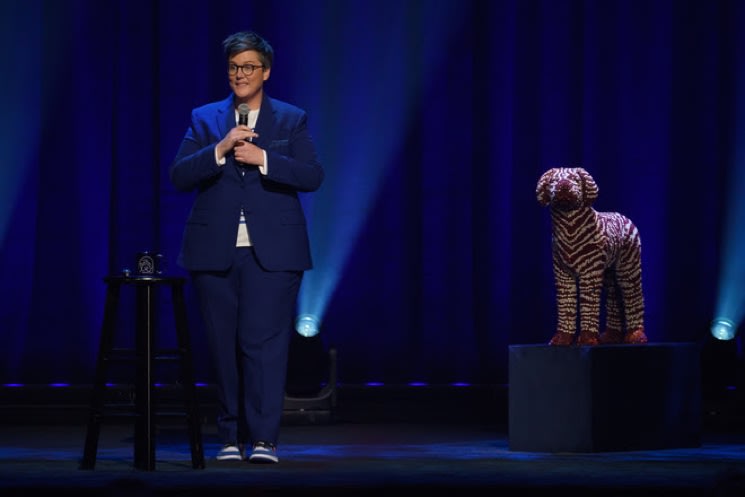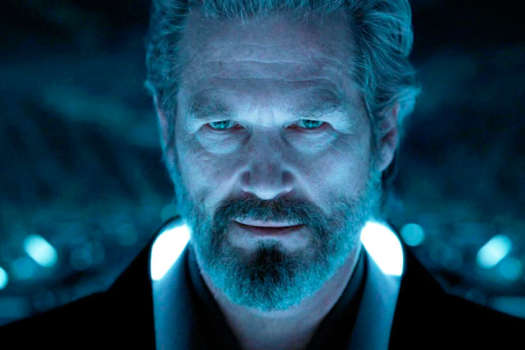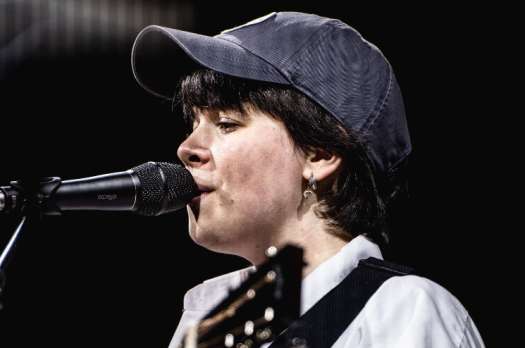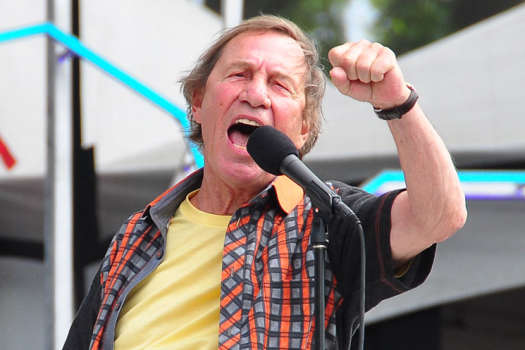Hannah Gadsby's latest Netflix special, Douglas, is rigidly controlled, in a way diametrically opposed to the organic build and flow of her 2018 runaway hit Nanette. What this means is that, while this latest hour is still chock-full of Gadsby's searing and caustic humour, her spot-on observations, and her delightful take-down of high art, Douglas is comparatively safe. Buttressed by an underlying apprehension that shows up in the special through meta-commentary and a thorough preface, the special is restrained and leaves viewers questioning any expectations they may have had about Gadsby.
Now, don't get me wrong — Hannah Gadsby is brilliant and Nanette ought to be required viewing. But when Gadsby released the special two years ago, she didn't expect the reactions she got: while many might have felt validated by her observations surrounding sexual assault, other viewers felt unprepared for the show's more serious turns. To prevent such a feeling of unpreparedness, Gadsby begins Douglas with a thorough description of what audiences should expect of the show.
The preface is hilarious, but it stretches on for about 15 minutes. It's methodical in its explanation of not only what she will say during the show, but also in anticipating and describing how we as viewers will react. In Nanette, Gadsby did a wonderfully sly thing where she explained how comedy works — the comedian creates tension and then diffuses it through the punch line. And also in Nanette, Gadsby subverted this comedic work by continuing the tension, continuing to tell her story without always rewarding the audience with a joke. While she told us of the comedian's M.O., she didn't give away the stories themselves until she was telling them.
In Douglas, however, during the play-by-play, she does give away some of the jokes — perhaps so that viewers don't feel their expectations have been let down. Gadsby is effectively setting our expectations for us, because, as she says, she put her all of her "trauma eggs" in one basket with Nanette and did not want to give anyone the idea that Douglas would be a continuation of the previous special.
But the reason why Nanette was so spectacular was because its form — distinct from the content — caught me off guard, made me cry and laugh.
With Douglas, Gadsby, in her attempt to make sure people don't harbour the wrong expectations, created a show that — while still good — is pristine, glossy with a controlled perfection. In the preface, she tells us that we will be surprised by how great a certain joke will be, but that we won't remember her telling us to expect it — but we do remember her telling us, while also being meta-aware of how she told us that we would remember her telling us that we would forget. It's a confusing intersection of awarenesses that ends up complicating the show, some of the deliveries, and that doesn't help Douglas's success.
Gadsby is funny, flooringly intelligent, and I wouldn't have minded if she hit me over the head with a million jokes just tearing art history departments (and the male-centric view of high art) a new one. She didn't have to set my expectations, but by so doing, she leaves us with a kind of confusion — we already know so much of what she is going to say before she says it — that is almost a disappointment, despite her best efforts.
That being said, Gadsby takes the time in Douglas to tell us that she has autism, and makes some of the best observations regarding autism — how it presents differently in different people — that I have heard, and delivers them through her brilliant and funny point of view. Through her observations, she brillaintly shows us what it looks like for her to live with autism. Douglas is funny, and it's a relief that Gadsby hasn't (as she mentioned in Nanette) given up comedy — but maybe she didn't need to prime our expectations quite as much as she did.
Perhaps in the end we're to blame for this, for allowing our expectations to dictate our perceptions. When a female comedian makes a viewer uncomfortable, online trolls hurl insults at her — while many male comedians have been incensing women for years without receiving virulent hate messages. Gadsby is a voice we need. Viewers who expected one thing of Gadsby, but got something else altogether with Nanette, are ultimately to blame for the control that brackets Douglas.
(Netflix)Now, don't get me wrong — Hannah Gadsby is brilliant and Nanette ought to be required viewing. But when Gadsby released the special two years ago, she didn't expect the reactions she got: while many might have felt validated by her observations surrounding sexual assault, other viewers felt unprepared for the show's more serious turns. To prevent such a feeling of unpreparedness, Gadsby begins Douglas with a thorough description of what audiences should expect of the show.
The preface is hilarious, but it stretches on for about 15 minutes. It's methodical in its explanation of not only what she will say during the show, but also in anticipating and describing how we as viewers will react. In Nanette, Gadsby did a wonderfully sly thing where she explained how comedy works — the comedian creates tension and then diffuses it through the punch line. And also in Nanette, Gadsby subverted this comedic work by continuing the tension, continuing to tell her story without always rewarding the audience with a joke. While she told us of the comedian's M.O., she didn't give away the stories themselves until she was telling them.
In Douglas, however, during the play-by-play, she does give away some of the jokes — perhaps so that viewers don't feel their expectations have been let down. Gadsby is effectively setting our expectations for us, because, as she says, she put her all of her "trauma eggs" in one basket with Nanette and did not want to give anyone the idea that Douglas would be a continuation of the previous special.
But the reason why Nanette was so spectacular was because its form — distinct from the content — caught me off guard, made me cry and laugh.
With Douglas, Gadsby, in her attempt to make sure people don't harbour the wrong expectations, created a show that — while still good — is pristine, glossy with a controlled perfection. In the preface, she tells us that we will be surprised by how great a certain joke will be, but that we won't remember her telling us to expect it — but we do remember her telling us, while also being meta-aware of how she told us that we would remember her telling us that we would forget. It's a confusing intersection of awarenesses that ends up complicating the show, some of the deliveries, and that doesn't help Douglas's success.
Gadsby is funny, flooringly intelligent, and I wouldn't have minded if she hit me over the head with a million jokes just tearing art history departments (and the male-centric view of high art) a new one. She didn't have to set my expectations, but by so doing, she leaves us with a kind of confusion — we already know so much of what she is going to say before she says it — that is almost a disappointment, despite her best efforts.
That being said, Gadsby takes the time in Douglas to tell us that she has autism, and makes some of the best observations regarding autism — how it presents differently in different people — that I have heard, and delivers them through her brilliant and funny point of view. Through her observations, she brillaintly shows us what it looks like for her to live with autism. Douglas is funny, and it's a relief that Gadsby hasn't (as she mentioned in Nanette) given up comedy — but maybe she didn't need to prime our expectations quite as much as she did.
Perhaps in the end we're to blame for this, for allowing our expectations to dictate our perceptions. When a female comedian makes a viewer uncomfortable, online trolls hurl insults at her — while many male comedians have been incensing women for years without receiving virulent hate messages. Gadsby is a voice we need. Viewers who expected one thing of Gadsby, but got something else altogether with Nanette, are ultimately to blame for the control that brackets Douglas.




